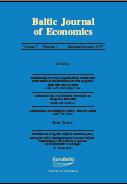Unions and the Coordination Problem in an Integrated Economy
Unions and the Coordination Problem in an Integrated Economy
Author(s): Domenico BuccellaSubject(s): Economy
Published by: BICEPS/SSE Riga
Keywords: Technological shocks; international production; integrated economy; trade union cooperation
Summary/Abstract: This work represents an extension of the model presented by Olivier Blanchard in occasion of the Lionel Robbins’ Lectures (2000) given at M.I.T. It analyzes the transnational cooperative behavior of trade unions in a two symmetric country-model with monopolistic competition firms present in the two markets under the possibility to shift production (i.e. through an increase in investments). In the case of technological shocks, firms are able to capture the advantage in wage differentials between the two countries. The country facing the shock has a loss in employment, while the other one faces a gain. But, if trade unions cooperate, in absence of transaction costs (costs to coordinate union activities), they are able to reduce the total loss of employment. If transaction costs are present, unions face a classical Prisoner’s Dilemma where the Nash equilibrium of the game is no cooperation, but this result is not Pareto-efficient.
Journal: Baltic Journal of Economics
- Issue Year: 7/2007
- Issue No: 1
- Page Range: 19-33
- Page Count: 15
- Language: English

